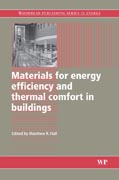
Almost half of the total energy produced in the developed world is inefficiently used to heat, cool, ventilate and control humidity in buildings, to meet the increasingly high thermal comfort levels demanded by occupants. The utilisation of advanced materials and passive technologies in buildings would substantially reduce the energy demand and improve the environmental impact and carbon footprint of building stock worldwide. Materials for energy efficiency and thermal comfort in buildings critically reviews the advanced building materialsapplicable for improving the built environment. Part one reviews both fundamental building physics and occupant comfort in buildings, from heat and mass transport, hygrothermal behaviour, and ventilation, on to thermal comfort and health and safety requirements. Part two details the development of advanced materials and sustainable technologies for application in buildings, beginning with a review of lifecycle assessment and environmental profiling of materials. The section moves on to review thermal insulation materials, materials for heat and moisture control, and heat energy storage and passive cooling technologies. Part two concludes with coverage of modern methods of construction, roofing design and technology, and benchmarking of façades for optimised building thermal performance. Finally, Part three reviews the application of advanced materials, design and technologies in a range of existing and new building types,including domestic, commercial and high-performance buildings, and buildings in hot and tropical climates. This book is of particular use to, mechanical, electrical and HVAC engineers, architects and low-energy building practitionersworldwide, as well as to academics and researchers in the fields of building physics, civil and building engineering, and materials science.
- ISBN: 978-1-84569-526-2
- Editorial: Woodhead
- Encuadernacion: Cartoné
- Páginas: 760
- Fecha Publicación: 01/04/2010
- Nº Volúmenes: 1
- Idioma: Inglés
